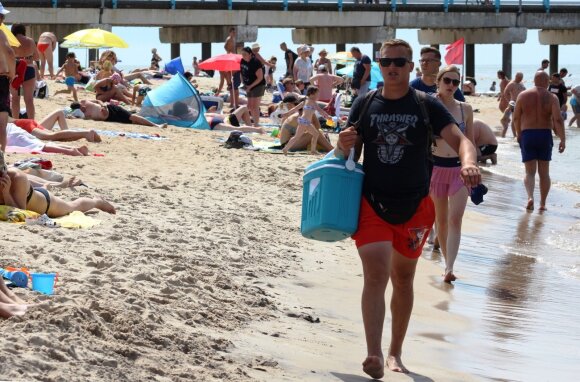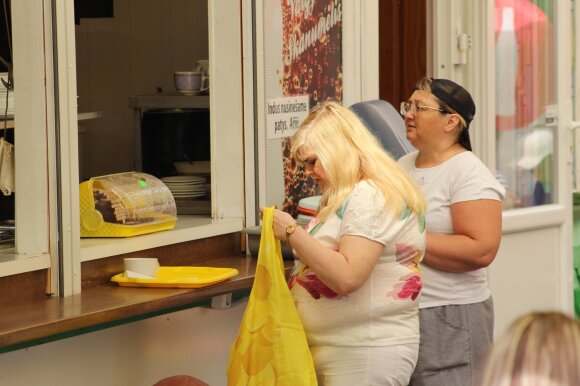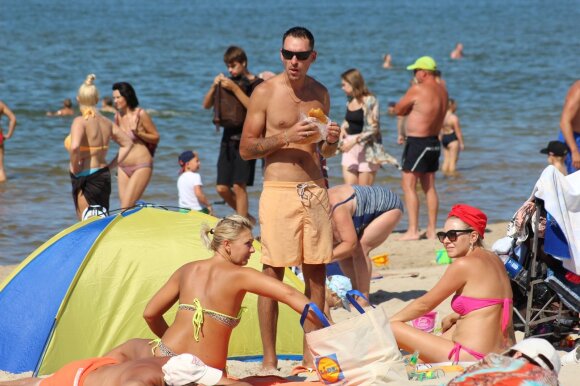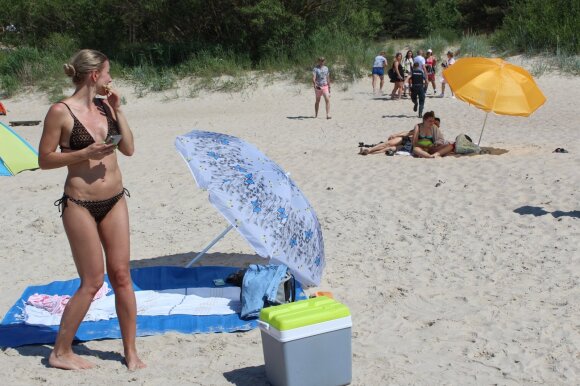
[ad_1]
Even during the heat in Palanga, there is no shortage of customers for restaurants, smaller cafes, self-service cafes, and even fast food kiosks.
It goes without saying that the cafes that produce cheaper dishes are located further away from J. Basanavičiaus Street. Not surprisingly, some have to wait for a free table during lunch. Here, in the cafe on Vytauto Street, the most expensive dish of pork shank costs 7.5 euros, Lithuanian cutlet – 6, zeppelins – 5.5, cutlets – 4.5 euros.
Slightly higher prices are achieved when entering the complex’s central promenade, J. Basanavičiaus Street. However, there are also cafes that offer dishes that do not exceed 6.5 euros.

© Mindaugas Milinis
It goes without saying that, among those offering economy class lunches, there are also restaurants where the Kiev chop costs 13.5 euros, the chicken fillet 11 euros, and the zeppelins 7.5 euros.
And in the kiosks that produce and sell fast food, you can buy and eat kebabs, which cost from 3 to 5 euros, and hamburgers, which cost from 5 to 9 euros.
Chebureks are an alternative to expensive lunches
In the cafes that operate on the beaches, the daily lunch already costs more: 7-8 euros. However, there is also an alternative by the sea: you can eat a cheburek brought by a helpful guy.
By the way, these products are more expensive this year than last year; now this dish costs 3 euros, last year, 2.5 euros.

© Mindaugas Milinis
It is true that this activity, delivery and sale of food on the beaches, is illegal in Palanga. Therefore, these boys and girls do not know when and where the persecutors will come from, who will not only take away the cold bag with the products, but will also impose an administrative fine. Although it is a real free market activity, if there is demand, there must be supply, but since 2004, it became illegal.
Until 2004, the sale of food products on the beaches was legal, the municipality issued permits with a cost of 200 to 550 litas, thus complementing the city’s budget.
These activities are now being punished. According to the Code of Administrative Offenses, it is a violation of the order of commercial or economic activity, which incurs a fine of three hundred ninety to one thousand one hundred euros. It is true that police officers impose half the minimum fine of 195 euros on Chebureks sellers.
Last weekend, three vendors were fined.
Although all the representatives of the authorities have recognized that this activity can and should be legalized, no concrete steps have been taken.
Delfi, advisor to the mayor of the municipality of the city of Palanga, briefly replied that no permits were issued for the trade of take-out food on the beaches of Palanga. Why? This question, although repeated several times, has not received an answer.
A year ago, the mayor of the municipality of Palanga, Šarūnas Vaitkus, mentioned that it is more beneficial for vacationers to eat in cafes than in the sand. The authorities of the complex seem to be able to allow such activities, but the hygienists are against it.

© Mindaugas Milinis
The latter say they would not object, but the resort authorities do not support it.
The activity is legal but illegal
Cheburek’s own vendors claim to have registered their activities with the Tax Inspectorate and have certificates indicating “food and beverage service activities”. However, in addition, they must have a permit from the Palanga Municipal Administration, which does not even allow languages, and register food handling activities with the State Food and Veterinary Service (SFVS).
Rita Viskantienė, an advisor to the SFVS Klaipėda department, told Delfi that the freshness, safety and quality of Chebureks, perishable and temperature-sensitive products, are determined by proper storage conditions. If chebureks are to be delivered to consumers within 2 hours of production or stored in containers that maintain a temperature of 68 ° C. If these requirements are met, there should be no risk to the safety of the products, their quality and consumer health.

© Mindaugas Milinis
“So far we haven’t received any requests from Palanga. But we doubt those guys are transporting food from nearby cafes like they should. If the cafe worked on the beach and heated up those chebureks and those kids took them to vacationers as messengers. of Wolt or Bolt, they would give purchase receipts, I would not see any problem. Without a doubt, such activities could be legalized. However, these products are prepared without knowing where and under what conditions “, considered R. Viskantienė.
Meanwhile, tourists are happy to buy the chebureks brought in. As long as there is demand, there will be supply. Although illegal.
It is strictly forbidden to use the information published by DELFI on other websites, in the media or elsewhere, or to distribute our material in any way without consent, and if consent has been obtained, it is necessary to cite DELFI as the source. .
[ad_2]